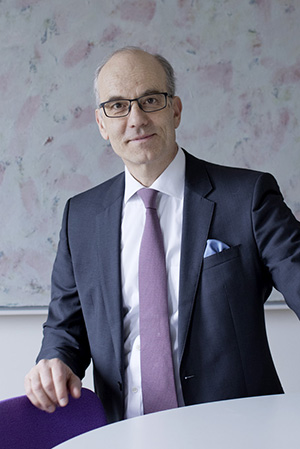Europe and the European civilisation have long traditions that have been refined over time. The European tradition and ideals include democracy, the rule of law, freedom of the individual and information, the market economy, and a limited role for the state. While each individual can single out and ascribe special significance to specific values, there is a broad consensus in Europe as to the importance of these themes. The war of aggression launched by a totalitarian state has strengthened the sense of unity in Europe. The Western ideals are under attack. People have discovered that it is of utmost importance to protect these values on which everyone agrees at least in broad outlines.
The themes raised in public debate have varied over the past few years. Words such as liberalism, capitalism and socialism are not much used today because they appear somehow outdated and fail to respond to the needs of the times. They date back to the previous century when they were used as slogans or words of abuse depending on the speaker’s point of view. For at least 150 years, political decisions have reflected a compromise between these tendencies. Political parties have taken bits and pieces of these ideas insofar they fit their own agenda. Generally, it may be good that no single tendency dominates but that decisions are based on compromise and political horse-trading.
The totalitarian threat
A totalitarian society is the opposite of democracy. A totalitarian system is characterised by restrictions on individual freedoms, an arbitrary judiciary, weak protection of property and favouritism towards those close to the ruler. The state plays a powerful role in a totalitarian society, although the market economy and the price mechanism are allowed to operate in areas where state intervention is not deemed necessary. For tyrants, instability generates stability. Small – or large – border skirmishes provide an excuse for limiting individual freedoms and increasing state control and arbitrariness. In conditions of instability, the tyrant’s position grows stronger.
Europe has its own dark history under the thumb of tyrants. However, past experiences, the spread of education and the creation of the EU have produced a long period of peace in Europe.
Future path
In a recent State of the Union speech, EU Commission President Ursula von der Leyen said that Europe is pursuing a ‘social market economy’. In Germany, social market economy has long been used as a term to describe a system in which the state provides a social safety net while the wheels of the economy are allowed to turn according to market principles. Hence, the leading ideology in Europe is the social market economy, the direction in which policies are shaped.
Political economy is standing at a crossroads. It is a proposition put forward by Gary Gerstle in his book ‘The Rise and Fall of the Neoliberal Order’ saying that the era of neoliberalism met its fate in the financial crisis of 2008. What ideas will follow is the big question of our times, he writes. According to neoliberalism individual freedom in the economy should be extensive and individual decision-making should not be restricted, whereas the role of the state and regulation of the economy should be minimised.
In the face of crisis, the role of the state will also grow in Europe. As in the Covid-19 pandemic, the state definitely needs to assume a central role in managing the crisis. This also holds true for future crises: individual freedoms will be curtailed and the role of the state highlighted.
A new emerging risk is hybrid operations and hybrid warfare, something that the West used to be ill-prepared for in terms of identification and defence. The world is moving in a direction where hybrid operations will be commonplace, thereby transforming the notions of individual freedom and the role of the state. Once the crisis is over, traditional themes will take centre stage and regular rights will be restored.
In conclusion
The thought of economic liberalism is an integral part of the European history of ideas. That has been one building block for the development of the economy and economic system in Europe and the West. Capitalism, the ‘laissez-faire’ economy and the current social market economy are examples of the evolution of economic thought. At the heart of European thinking, there is always an element of freedom. The ideals of freedom need peace to thrive. Europe defends freedom.
Already a century ago, it was argued that economic interdependence between countries could promote peace. Moreover, peace facilitates the international division of labour and specialisation because peace is a necessary prerequisite for international trade.
For investors, instability is toxic. For this reason, the compensatory measures taken by governments and central banks are of vital importance in the face of the current crisis. Investors often make investments both in Western markets and in non-democratic countries. To do so, it is necessary to have peace. As borders close in a war, uncertainty and risks increase. Aside from economic and other risks, the current crisis is about defending Western ideals.
The writer is VER's CEO Timo Löyttyniemi.
